|
|
Uncle Tom's Cabin. |
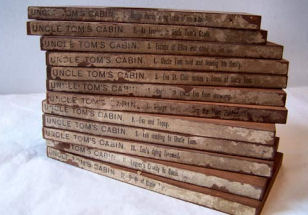 The wonderful magic lantern slides that illustrate Harriet Beecher Stowe's world famous story are made by the C.W. Briggs Company and have been drawn around 1880 by the American artist Joseph Boggs Beale (1841-1926), one of the few nineteenth-century artists who created artwork expressly for reproduction on magic lantern slides. Below the original readings that accompanied these slides from an anonymous writer. |
|||
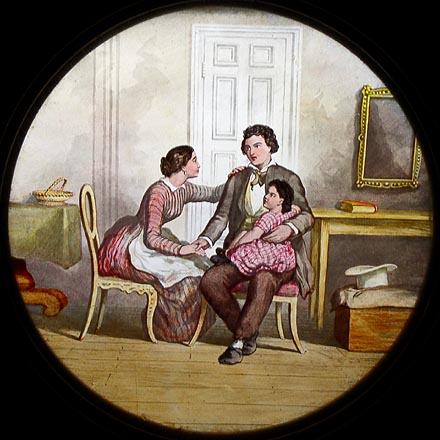 |
UNCLE TOM'S
CABIN. No. 1. George Harris Taking Leave of His Wife. Behold before us George Harris, with his wife and child. They are slaves, owned by different masters, the proprietors of neighbouring estates in the State of Kentucky. George was an intelligent and rather handsome young mulatto. He was hired out by his master to work in a bagging factory, where he was considered as the first hand. He had invented a machine for cleaning hemp, and his master, hearing of his invention, rode over to the factory to see what his intelligent chattel had done. It was given to George to show him over the factory, and, being in high spirits, George talked so fluently and looked so manly that his master, an uneducated man, began to feel his own inferiority, which so enraged him that he demanded George's wages and took him home—to show him his proper place, as he expressed it. At home George was put to the meanest work that could be found, subjected to all kinds of cruelty, and finally ordered to take one of the girls on his master's place for a wife. |
||
| This was more than George could stand, for he loved Eliza, and being sent on an errand which took him past the house of Mr. Shelby, Eliza's master, he stopped and told her of all the cruelty to which he had been subjected, and astonished her by announcing his intention of running away to Canada. In the picture we see Eliza earnestly entreating him to be careful not to do anything that might bring him harm or that he might afterward regret, and to put his confidence in Providence. She did not dissuade him from running away, and a short time afterward he was missing. | |||
| No. 2. An Evening in Uncle Tom's Cabin. The cabin of Uncle Tom was a small log building, whose rude front was almost entirely hidden from view by the interlacing of a large scarlet bignonia and a native multiflora rose. But let us enter. Aunt Chloe, Tom's wife, has just come from "the house," where she had presided over the preparations for the evening meal, and we now see her busy getting her "ole man's" supper. While thus engaged, she now and then turns her beaming face in the direction where Tom and George Shelby, a boy of thirteen, are sitting together at a rude little table. Uncle Tom, Mr. Shelby's best hand and head man, is a large, broad-chested, powerfully-made man, with a full, glossy, black face, whose truly African features are characterized by an expression of grave and steady good sense, united with kindness and benevolence. We see him deeply intent on examining some letters, which young Mas'r George has written on a slate for him to copy. After a nice supper, which Aunt Chloe, the head cook of the Shelby establishment, had been preparing for them, the table is cleared off, and the room put in order for the "meetin'," which was held there that night, and at which George Shelby supplied the place of a minister. |
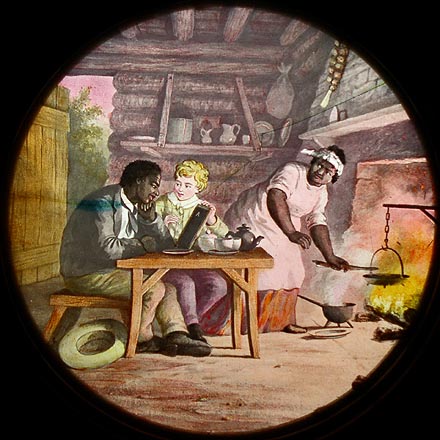 |
||
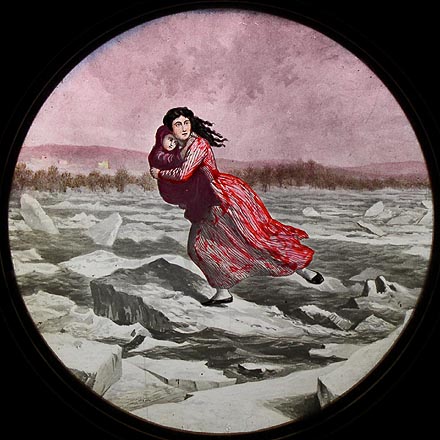 |
No. 3. Escape of Eliza and Child on the Ice. One evening Eliza overheard her master telling his wife that unfortunate pecuniary circumstances had compelled him to sell Harry, Eliza's little boy, and Uncle Tom. Eliza, though greatly terrified, did not lose her presence of mind. She thought of her boy, and determined to save him. Going to her room, she hastily made up a package of clothing, then, awakening her boy and dressing him, she took him on her arms and glided noiselessly out. As soon as her flight was discovered in the morning, Mr. Haley, the trader who had bought Harry, assisted by some of Shelby's hands, prepared to pursue her, but owing to various circumstances they did not get off till afternoon. Eliza, in the meantime, had reached the Ohio, and was resting at a small public house. While standing at the window and looking out, she saw her pursuers come galloping down the road, and as she instantly stepped aside, they passed the window without seeing her and came around by the front door. As soon as they had passed, Eliza took up her boy, and, going out by a side door, ran down to the river, with her pursuers, who had now caught sight of her, close behind. | ||
| All seemed lost, when, uttering a wild shriek, she gave a desperate leap and landed on a cake of ice far out from the shore; from this she leaped to another, and then to another, until she finally reached the Ohio shore, where a man helped her up the bank. The picture before us presents her thus leaping from one cake to another. | |||
| No. 4. Uncle Tom Sold and Leaving His Family. A grey, drizzling February morning looked in through the windows of Uncle Tom's cabin upon downcast faces and sad hearts. It was Tom's last morning at home. Though sad at heart, he was quite resigned, and tried to comfort his poor wife by assuring her that he was in the hands of Providence and would be taken care of. After breakfast, while Aunt Chloe was engaged in packing her husband's clothes, Mrs. Shelby came in to bid her faithful servant "good-bye," telling him at the same time that she would keep track of him and redeem him as soon as she could raise the money. She had scarcely finished, when Mr. Haley, with an unceremonious kick, pushed open the door, saying, as he did so, "Come, ye nigger, 'ye'r ready?" Tom rose up meekly, and, shouldering the heavy box which contained his clothing, prepared to follow his new master. His wife took the baby in her arms to go with him to the wagon, and children, crying, trailed behind. The wagon stood ready harnessed at the door, and here all the hands on the place had assembled to bid farewell to their old associate, for Tom had been looked up to, both as a head servant and as a Christian teacher, and much honest sympathy and grief was expressed for him. |
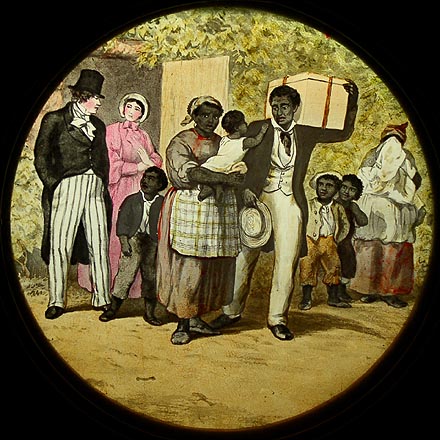 |
||
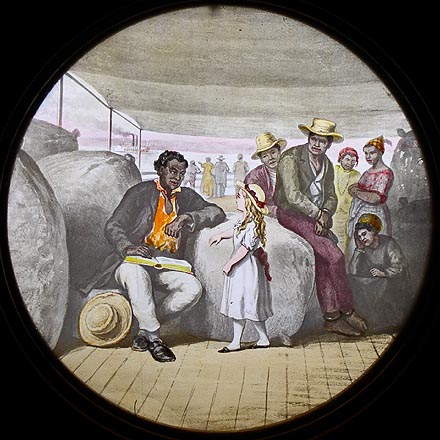 |
No. 5. Eva St. Clair Makes a Friend of Uncle Tom. We next find Uncle Tom, with his companions (for Haley had increased his stock on the way) on board of a boat that was bearing them rapidly down the Mississippi. Among the passengers on the boat was a gentleman by the name of St. Clare, a resident of New Orleans, now on his way home from Vermont, where he had been visiting some relations. He had with him his only daughter, Evangeline, or Eva, as she was called for short, and a maiden cousin, Miss Ophelia St. Clare, whom he had persuaded to return with him to his Southern home. Eva was a delicate, gentle child. Her face was remarkable for its singular and dreamy earnestness of expression. She was always in motion, and took a busy interest in all that was going on. Tom, who was enjoying the privilege of coming and going whenever he pleased on the boat, having won Mr. Haley's confidence, once caught sight of Eva while thus flitting about. He watched her a great deal, and longed to talk with her. Often, while seated in some nook among the cotton-bales, studying over his Bible, he would, on looking up, find her deep blue eyes peering at him from behind some dusky cotton-bale or looking down upon him over some ridge of packages. | ||
| Taking advantage of such a position, Tom one day took heart and asked the little one her name, thus opening a friendship which became long and lasting, Uncle Tom, at Eva's earnest solicitation, having been bought by Mr. St. Clare. | |||
| No. 6. Uncle Tom Saves Eva from Drowning. Although we have spoken of Eva in a former picture, it seems but just that we should more fully describe both her appearance and character. Her form was the perfection of childish beauty, without its usual fullness of outline. There was an aerial grace, an indescribable sweetness, about her that breathed alone of heaven. The shape of her head and the turn of her neck and bust were peculiarly noble, and her blue eyes, so fine and expressive, made her very fascinating to the most unimpressionable. Nevertheless, she was not a grave or sad child, but playful, happy, and buoyant; she moved around with a light, elastic tread, singing to herself as in a pleasant dream. She went over the boat wherever she chose, was interested in all things and persons that she saw. Many times a day rough voices blessed her, and soft smiles stole over hard faces as she passed, and when exposed to danger rough, sooty hands were ever ready to relieve or save her. Tom, being of a soft, impressible nature, was greatly attracted toward her, and to him she seemed almost divine. Tom was very anxious to make her acquaintance, so he offered her toys of his own make from cherry-stones and hickory-nuts and elder-pith, being quite a genius in that line. She was shy at first, but soon became more confidential. |
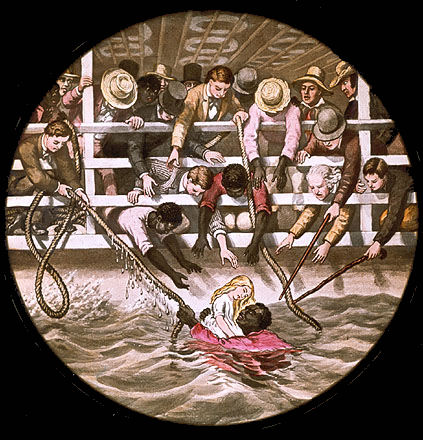 |
||
| She told him her name and he told her the children called him "Uncle Tom." "Well, then," she said, "I shall call you so, too, for I like you." She then asked him where he was going, and he said he did not know; he was going to be sold to somebody. "My papa can buy you," said Eva, quickly, "and if he buys you, you will have good times. I mean to ask him to this very day." Soon after this Eva was standing with her father near the railings to see the boat start; the wheel had made two or three revolutions when by some sudden movement the little girl lost her balance and fell over the side of the boat into the water. Tom was standing just under her on the lower deck as she fell. He saw her strike the water and sink, and was after her in a moment, and when she rose to the surface he caught her in his arms, and, swimming with her to the boat side, handed her, dripping, to hands eagerly stretched out to receive her. She was borne to the ladies' cabin, the next day only appearing a little paler for the accident. The father might have been influenced by this event in deciding to buy Uncle Tom. Eva's reason was, "she wanted to make him happy." No doubt she had her wish. | |||
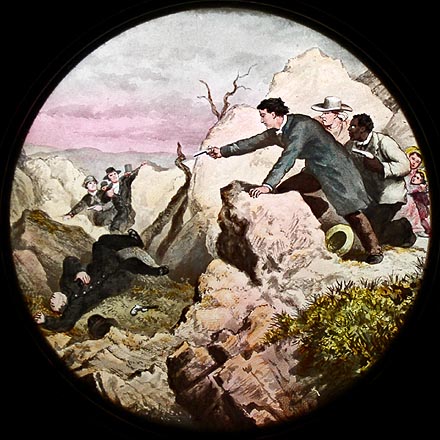 |
No. 7. George Harris Resisting the Slave-Hunters. After the sad parting of George Harris and his wife he made his escape and travelled in disguise as a gentleman, with a coloured man as his servant, who had also escaped from slavery. He went through the country, and finally found his wife and child at a Quaker settlement, where they had found a temporary home and were treated with great kindness. While there, a friend came to the house who had stopped at an inn on his way and had overheard men planning to capture them. They therefore started in the night, thus hoping to evade their pursuers; but they found they were on their track. The Quaker who had informed them of their danger drove the wagon and acted as guide. He drove them through long woods, over wide, dreary plains, up hills and down valleys, and on, on, until toward morning they heard the sound of a horse's hoof coming in the distance. It was a friend who had come to inform them that their pursuers were coming, furious as wild beasts. They raced their horses until they came to a fence, and then sprung from their seats and began to ascend the rocks with the greatest speed, the stronger supporting the weaker. | ||
| A few moments' scrambling brought them to the top of the ledge; then the path was so narrow that only one could walk at a time; then they came to a chasm, beyond which lay a pile of rocks, with steep, perpendicular sides thirty feet high. They leaped the chasm and seated themselves on a carpet of crisp, white moss which covered the top of the rocks. Their pursuers made a desperate attempt to follow them, but George Harris arose and made a grand speech. He told them that "he was a free man; that he claimed his wife and child, and that if any of them dare to come there he would shoot down as many as made the attempt." One of the most desperate of the slave-hunters fired at George Harris but missed his aim; they were almost at the verge of the chasm, and George fired and hit one of his pursuers in the side, who, with a yell like an infuriated beast, sprung forward, when the Friend suddenly went to the front and said: "Thee isn't wanted here," and pushed him down the declivity among the bushes, logs, and stones. His own party then deserted him, but the Quakers cared for him. Our fugitives now pursued their journey to Canada, and finally reached there, which was to them the "promised land." | |||
| No. 8. Eva and Topsy. Topsy was a little negro girl about eight years of age. She had been brought up in utter ignorance of everything except vice, having been bought while a mere child by a speculator and raised with a number of others. Mr. St. Clare bought her from a couple of low, drunken tavern-keepers, who had been abusing her, and presented her to his cousin, Miss Ophelia, to educate. Miss Ophelia determined to confine Topsy's sphere of operation and instruction to her own chamber, and accordingly Topsy was immediately initiated into the mysteries of chamber-work. The first trial was a success, so far as the work was concerned, but it did not end as well as might have been wished, for while Topsy was making up the bed Miss Ophelia discovered the end of a ribbon hanging from one of her sleeves, and giving her a shaking, saw her gloves drop from the other. After considerable arguing and threatening, Topsy confessed her guilt, but Miss Ophelia, suspecting her of further theft, told her that she must confess all. Accordingly, Topsy, thinking she must confess, whether or not, said she had also taken Eva's coral necklace and one of the servant's coral ear-drops, and when asked to return them, she said that she had burned them; when, imagine Miss Ophelia's astonishment, both girls entered the room wearing their respective articles of adornment. |
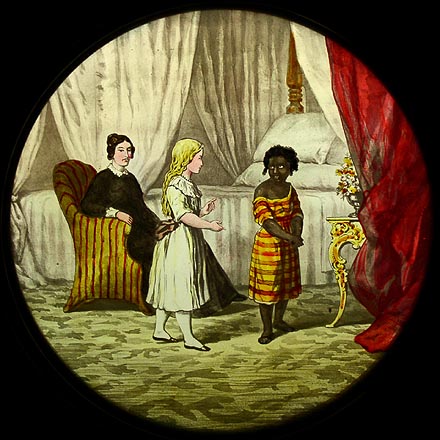 |
||
| When asked why she told such lies, she demurely said, "Why, Missus said I must 'fess, and I couldn't think of nothin' else to 'fess." Eva, hearing all that had happened, at first stood perfectly still, looking at Topsy with an innocent, pitying gaze, and then, walking up to her, she said, in her sweet, silvery voice, "Poor Topsy, why need you steal? I'm sure I'd rather give you anything of mine than have you steal it." Thus we here see them together in the picture. Topsy afterward improved greatly by companionship with Eva. | |||
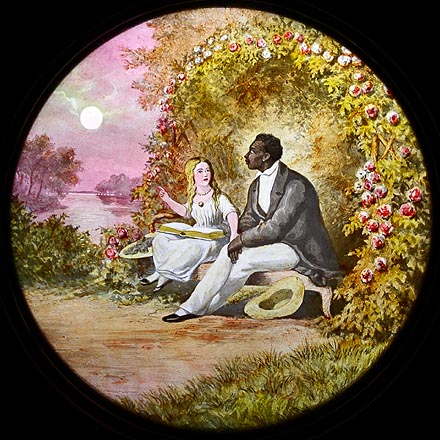 |
No. 9. Eva Reading to Uncle Tom. Uncle Tom, who had been made the especial servant of Eva, took great delight in serving his little mistress in every possible way, while she was equally zealous in kind offices toward him. Though but a child she was a beautiful reader, and often the two sat together, Tom listening while Eva read over his choice passages in the Bible. At first, she read to please her humble friend; but soon her own earnest nature threw out its tendrils and wound around the majestic Book. We see them before us seated on a mossy seat, in an arbor at the foot of the garden, at Mr. St. Clare's summer villa on Lake Pontchartrain. It is evening. Eva's Bible lies open in her lap. She reads: "And I saw a sea of glass mingled with fire," then, suddenly stopping and pointing to the lake, she says: "Tom, there it is, there's 'a sea of glass mingled with fire.'" And there, indeed, was a most beautiful representation of what she had just read, for there was one of those intensely golden sunsets, kindling the whole horizon into a blaze of glory, which is reflected on the smooth, glassy water of the lake. | ||
| After this they talked of that New Jerusalem which was to descend from heaven, and then of the bright hands of spirits robed in spotless white, of which Tom had just been singing, when, after a short silence, the child suddenly got up, and pointing to the sky, said: "I'm going there, Tom, 'to the spirits bright;' I'm going before long!" | |||
| No. 10. Eva's Dying Farewell. The friendship between Uncle Tom and Eva grew stronger and deeper, day by day. It would be hard to say what place she filled in his hard, desolate heart. He loved her with a deep and fervent tenderness and reverence, and almost worshiped her as something angelic and divine. He was always on the lookout for the rarest flowers and the choicest fruit. Nor was Eva less zealous to return kind deeds. Eva was a beautiful reader, with a quick, poetic fancy and an instinctive sympathy with what is grand and noble, so that to Tom the reading was wonderful. She read about the New Jerusalem, and Tom sung from his hymn book about the "spirits bright" that dwelt there "all robed in white," and she said she had seen them, that they came to her in her sleep. When she said that, the thought came to him for the first time that Eva was "fading away." Her hands were thinner, her breath shorter, and when she played in the garden she tired sooner and seemed more languid. He had heard Miss Ophelia speak of her cough, that medicine had failed to cure, and even then her hands were feverish and the hectic flush upon her cheeks. Miss Ophelia called her in and noticed her condition, and communicated her fears to her father. |
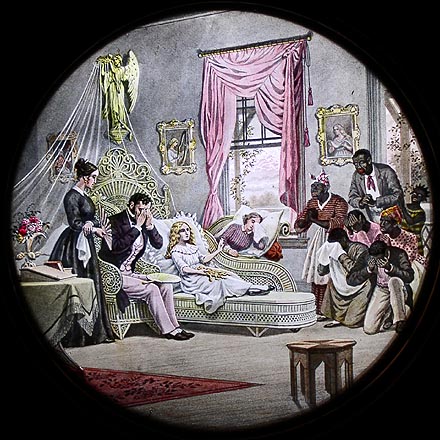 |
||
|
He was so unwilling to
have it so that he tried to disbelieve it. But it was plain the fear had entered
his heart. He kept by her more than ever, took her oftener to ride, and brought
home remedies for her. There was a daily increasing maturity to the child's
feelings and thoughts. She often made remarks that seemed almost an inspiration.
Soon after this St. Clare called Eva to him, and as she came her beauty was so intense and so fragile that it impressed him painfully. "Papa," said Eva, "I have wanted to say things to you for a good while; it is no use keeping it to myself any longer; I am going to leave you never to come back!" After she was obliged to keep her room she requested to have her hair cut, and then to have all their people come to her room. She told them she had sent for them because she loved them, and that she was going to leave them. There were groans and sobs and lamentations; then she said, "If you love me, listen; I want you all to be good, so that you can come where I am. I am going to give you all a curl of my hair, and when you look at it, think that I loved you and am gone to heaven." They fell on their knees, they sobbed and prayed and kissed the hem of her garment. But the change was near and the transition was peaceful and joyous. |
|||
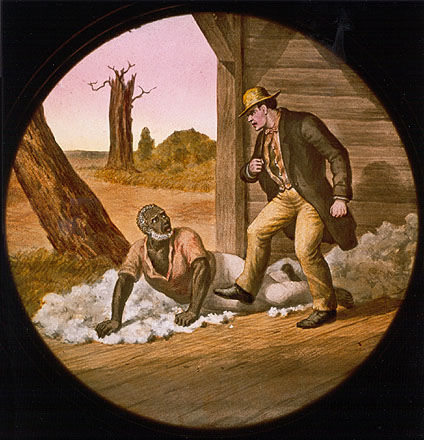 |
No. 11. Legree's Cruelty to Uncle Tom. The St. Clare establishment having been broken up by Mrs. St. Clare after her husband's death, Tom, with the other slaves, was sent to auction, where he was bought by a rough, heartless planter by the name of Legree. The man treated his slaves worse than he did his dogs. They were sent out early every morning and had to work in the cotton-field all day, and when they came home in the evening, all tired and worn out, instead of finding a good supper ready, each was given a small quantity of corn, which he had to grind and prepare himself. He was brutal in his management of them. Tom having one day refused to flog a woman, was himself flogged so unmercifully that his back was all bruised, and the flesh hung from it in tatters, and was then thrown into an old room of the gin-house, among pieces of broken machinery and other rubbish. It is there that we now see Tom, his cruel master having just come in to taunt and abuse him. He is just in the act of kicking him, telling him to get up, and mocking him, by asking him why he is so spry, as Tom succeeds, only with great difficulty, in raising himself. After thus abusing him a little while longer, he leaves him to the care of a young woman, who is to get poor Tom fixed up for work again. | ||
| No. 12. Death of Uncle Tom. Tom, by his steadfast persistency in doing what was right, had turned on himself the wrath and hatred of Legree, who was determined either to curb what he considered Tom's stubborn will, or to kill him in the attempt. This feeling toward Tom was by no means appeased when, some time afterward, two girls whom Legree had maltreated successfully made their escape from him. It made him furious, and suspecting Tom of complicity, he immediately sent for him. When Tom appeared, Legree walked up to him, seized him grimly by the collar of his coat, and speaking through his teeth in a paroxysm of rage, said: "Tom, I've made up my mind to kill you; I—have—done—just—that—thing, unless you'll tell me what you know about those gals." Tom confessed that he knew about them, but said that he could not and would not tell anything, rather die. Legree was as good as his word. Tom was flogged until he fainted entirely away, when he was thrown into a shed as dead. Here, two days afterward, a young man, no other than George Shelby, who had come to redeem him, found him in a dying condition, Tom breathing his last in the presence of his former young master, whom he loved dearly. |
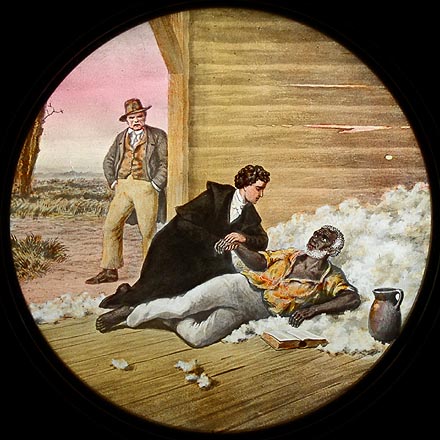 |
||
There are a lot more sets of magic lantern slides that tell the story of Uncle Tom. Below are four slides of a larger set that show that many slides were produced in different versions, like here for example a black and white version and a hand coloured one. The set is made by Alfred Pumphrey. |
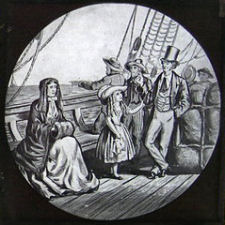 |
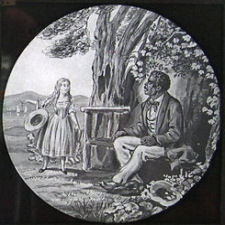 |
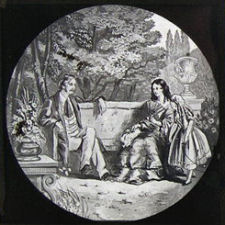 |
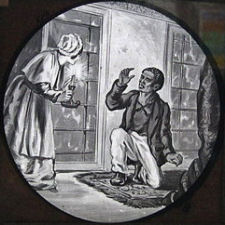 |
| This is the coloured version of the same set: | |||
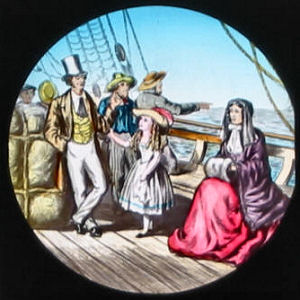 |
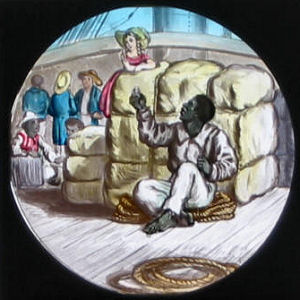 |
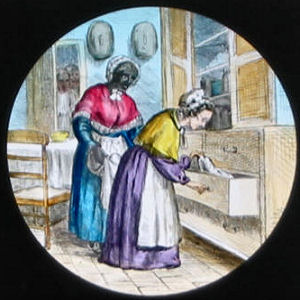 |
| 1. On the Steamer. | 2. Tom makes Eva Presents. | 3. Ophelia in the Kitchen. |
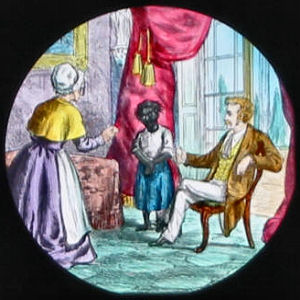 |
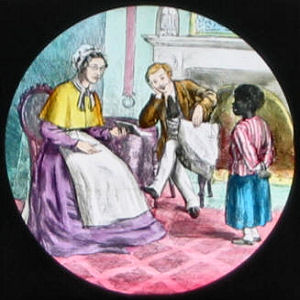 |
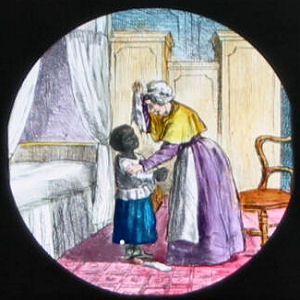 |
| 4. Topsy Bought. | 5. Topsy's Catechisms. | 6. Topsy Bedmaking. |
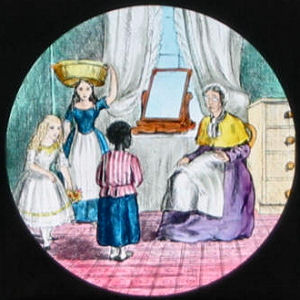 |
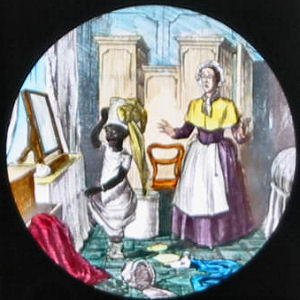 |
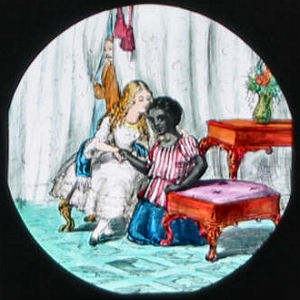 |
| 7. Topsy Confesses. | 8. Topsy and Miss Ophelia's Bonnet. | 9. Eva Teaches Topsy. |
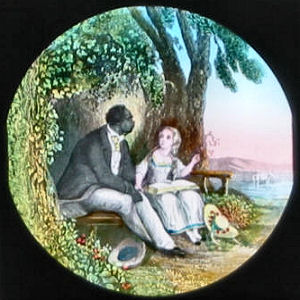 |
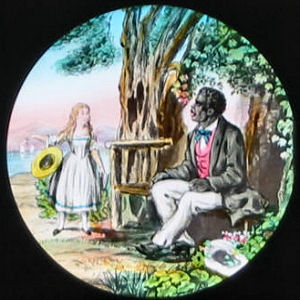 |
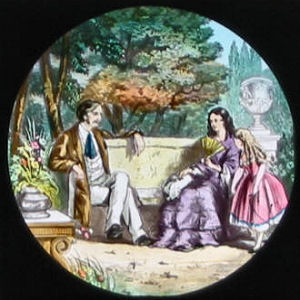 |
| 10. Tom and Eva Reading. | 11. Eva's Conversation. | 12. Eva in the Garden. |
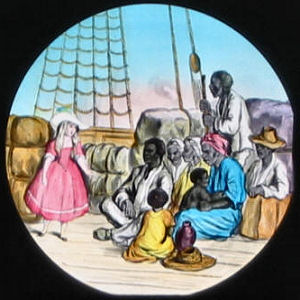 |
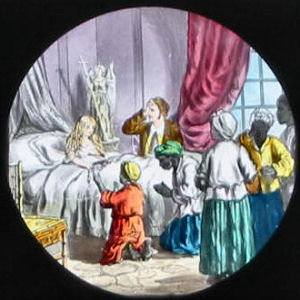 |
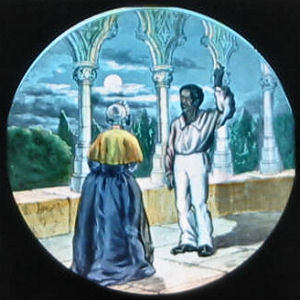 |
| 13. Eva Talks of the Steamer. | 14. Eva Calls the Servant to her Bed. | 15. Tom and Miss Ophelia. |
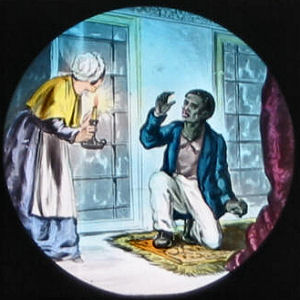 |
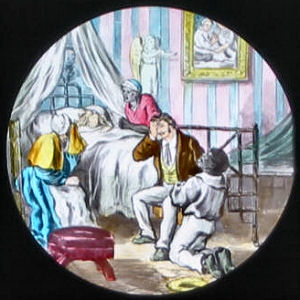 |
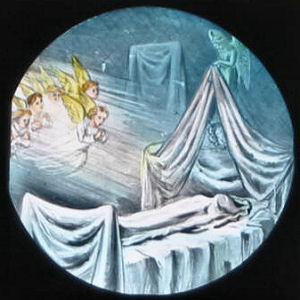 |
| 16. Tom Sent for the Doctor. | 17. Eva's Death Bed. | 18. Eva Lying Dead. |
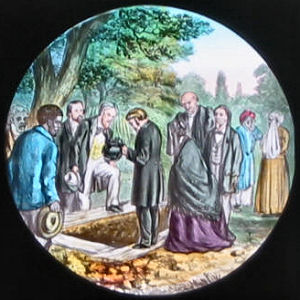 |
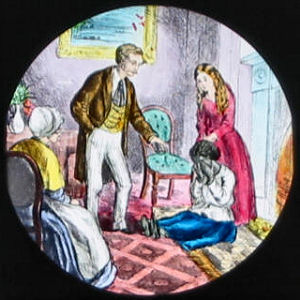 |
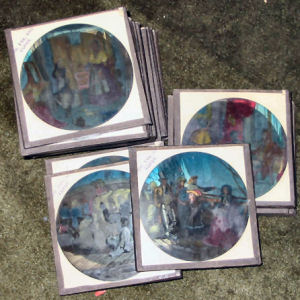 |
| 19. St Clare at Eva's Grave. | 20. Topsy Accused of Stealing. | |
|
|
||
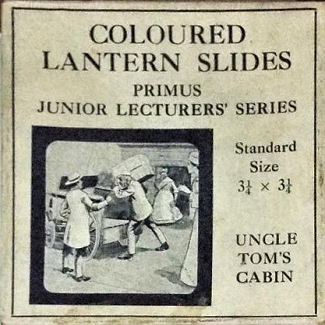 |
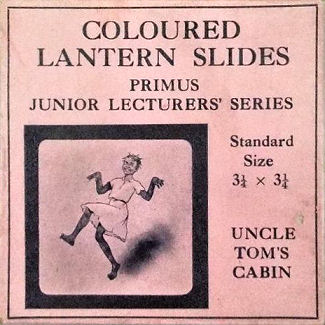 |
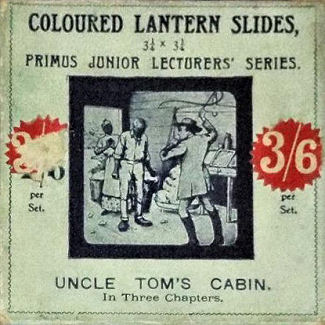 |
W. Butcher & Sons also
published the story of Uncle Tom in their well-known Junior Lecturers' Series in
three parts each containing eight slides. Below four of the 24 slides. See the full series here. |
|
Some examples: |
|||
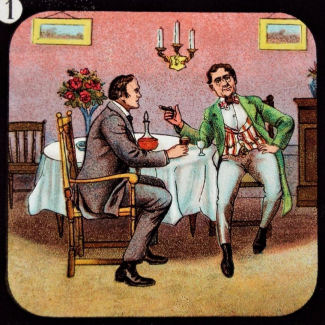 |
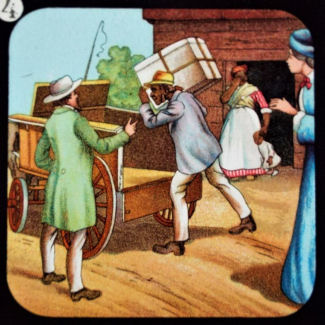 |
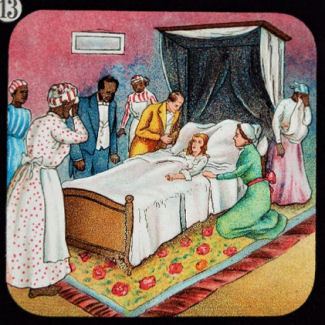 |
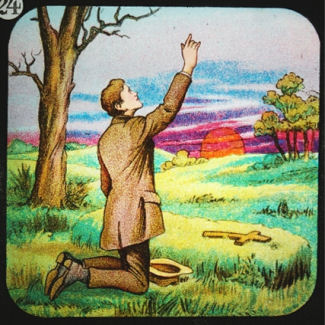 |
The three separate parts have also been published as a set of three parts in one larger box, together with the matching readings : |
|||
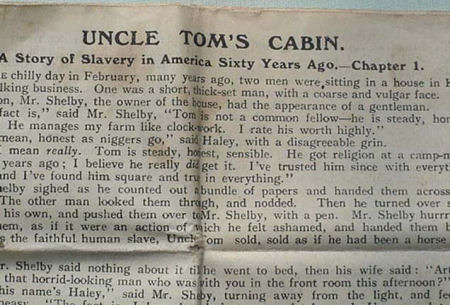 |
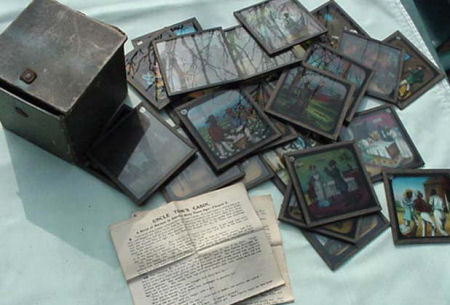 |
||
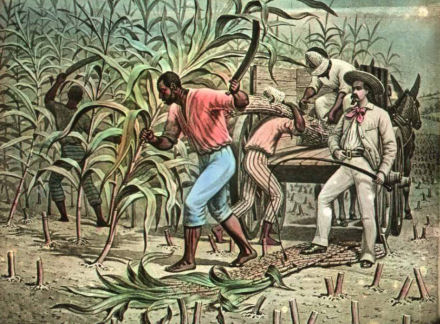 |
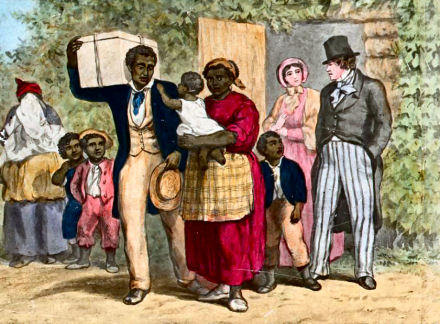 |
||
 |
Two magnificent slides from a set made by Boswell Manufacturing Co. Chicago, Stereopticons and Slides. The slides measure 4 x 3 1/4 inches. | ||
See also: Racial images on magic lantern slides?
|
|||
| |
©1997-2021 'de Luikerwaal' All rights reserved. Last update: 04-06-2021. |
|